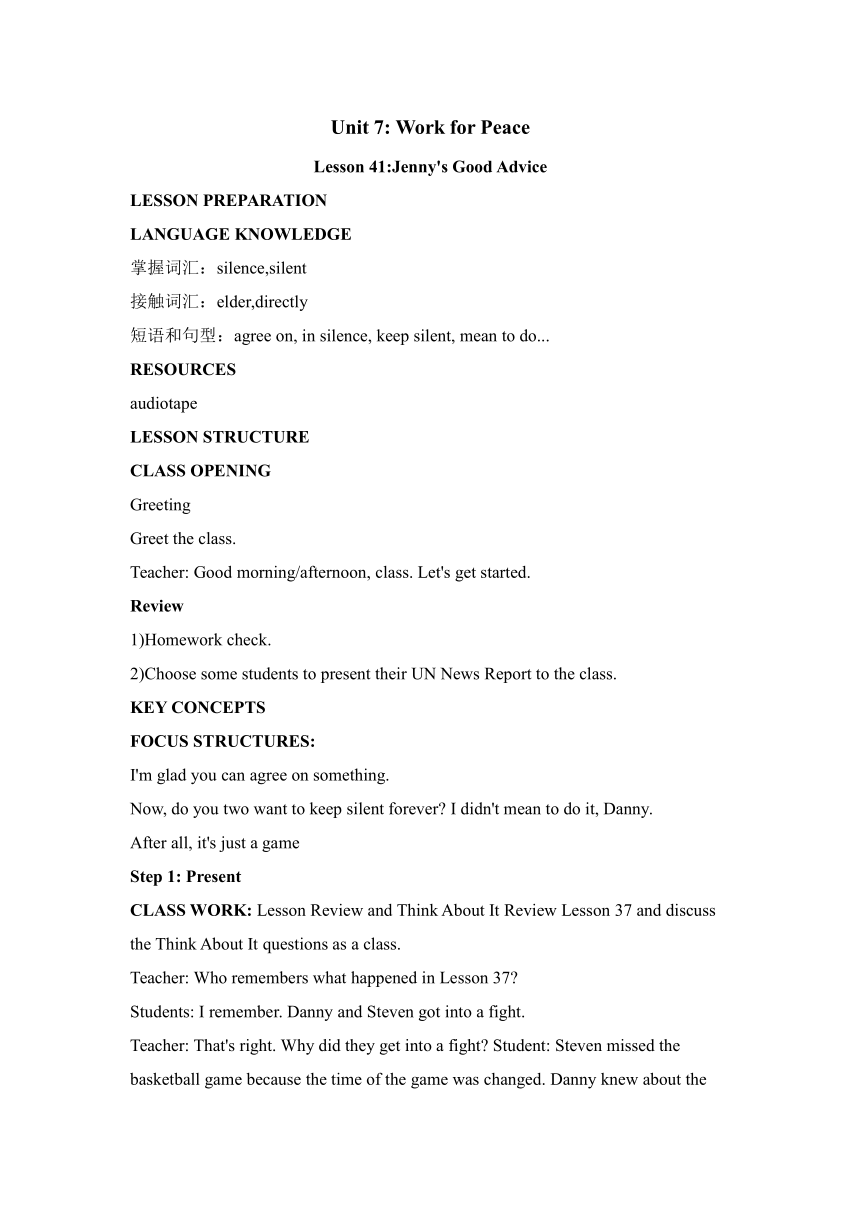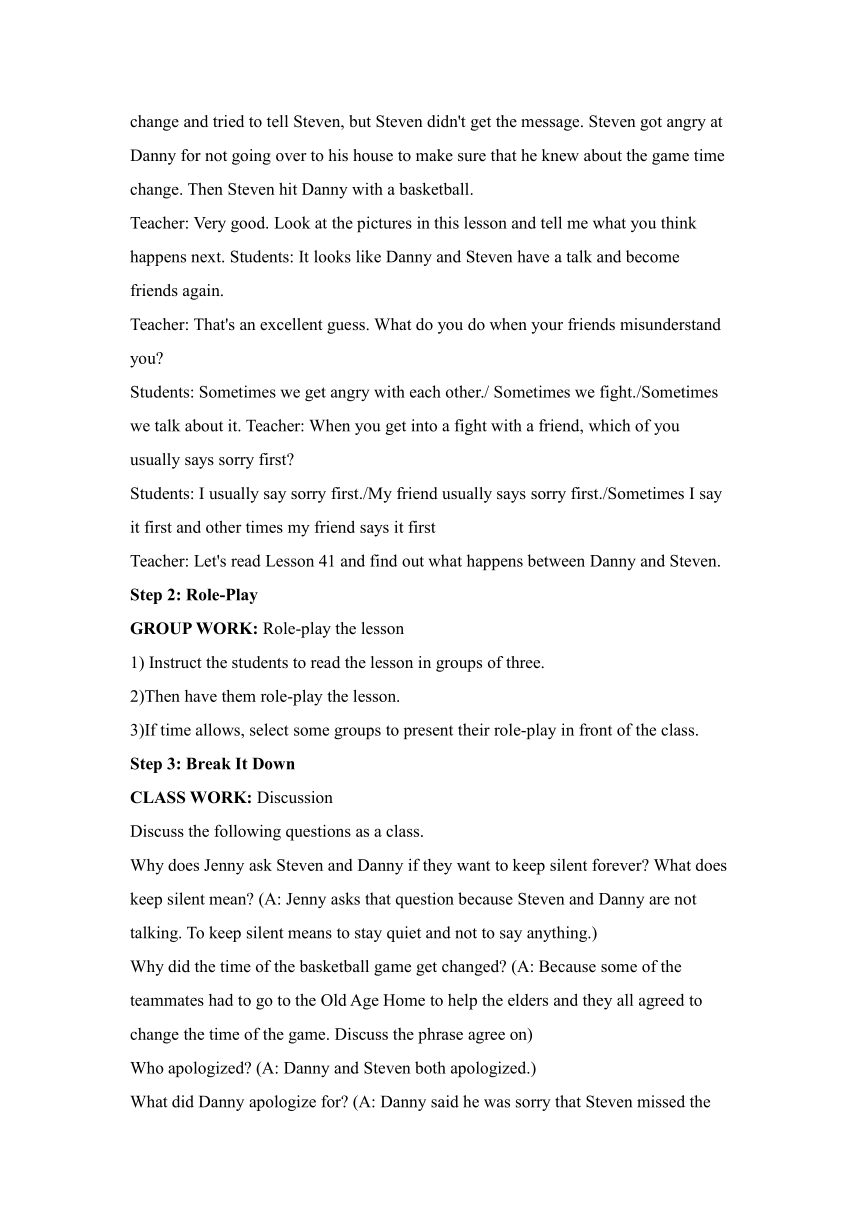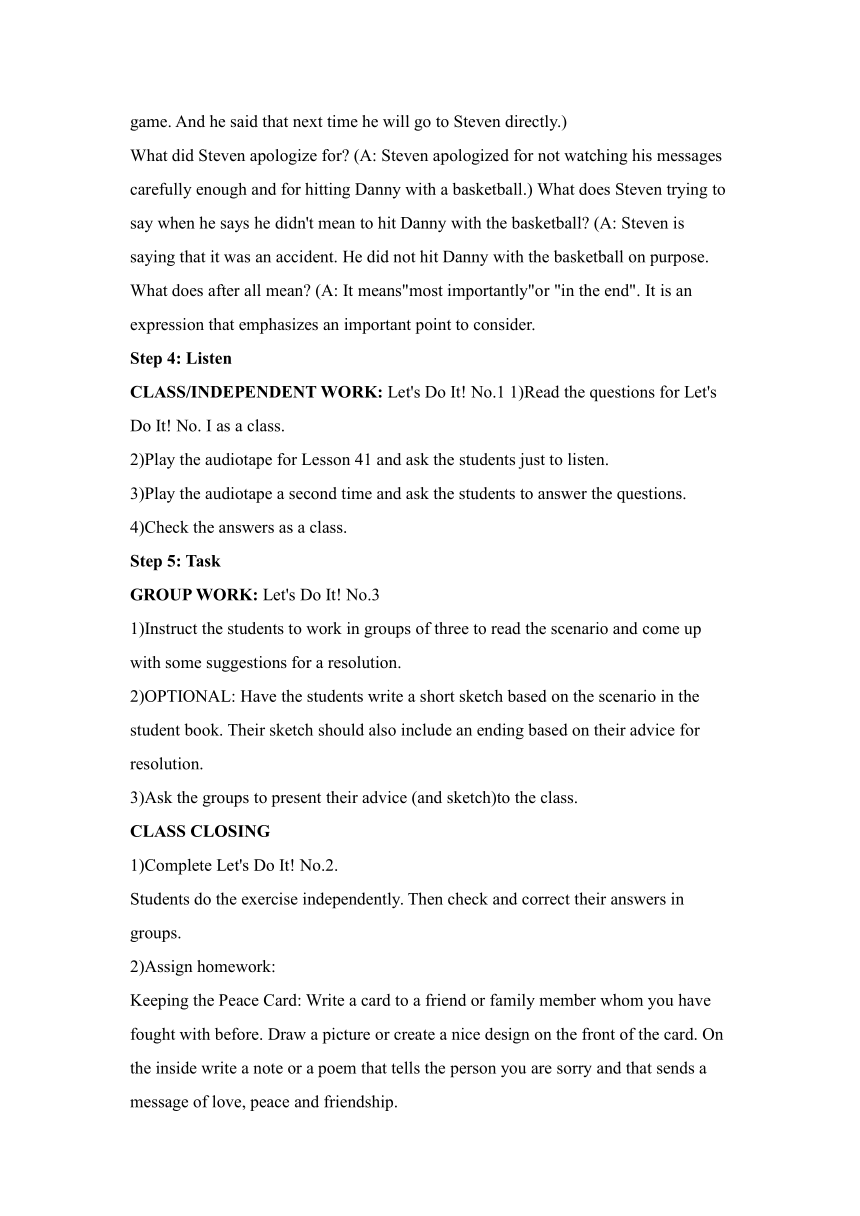Unit 7 Work for Peace.Lesson 41 教案
文档属性
| 名称 | Unit 7 Work for Peace.Lesson 41 教案 |

|
|
| 格式 | docx | ||
| 文件大小 | 18.4KB | ||
| 资源类型 | 教案 | ||
| 版本资源 | 冀教版 | ||
| 科目 | 英语 | ||
| 更新时间 | 2024-12-21 00:00:00 | ||
图片预览



文档简介
Unit 7: Work for Peace
Lesson 41:Jenny's Good Advice
LESSON PREPARATION
LANGUAGE KNOWLEDGE
掌握词汇:silence,silent
接触词汇:elder,directly
短语和句型:agree on, in silence, keep silent, mean to do...
RESOURCES
audiotape
LESSON STRUCTURE
CLASS OPENING
Greeting
Greet the class.
Teacher: Good morning/afternoon, class. Let's get started.
Review
1)Homework check.
2)Choose some students to present their UN News Report to the class.
KEY CONCEPTS
FOCUS STRUCTURES:
I'm glad you can agree on something.
Now, do you two want to keep silent forever I didn't mean to do it, Danny.
After all, it's just a game
Step 1: Present
CLASS WORK: Lesson Review and Think About It Review Lesson 37 and discuss the Think About It questions as a class.
Teacher: Who remembers what happened in Lesson 37
Students: I remember. Danny and Steven got into a fight.
Teacher: That's right. Why did they get into a fight Student: Steven missed the basketball game because the time of the game was changed. Danny knew about the change and tried to tell Steven, but Steven didn't get the message. Steven got angry at Danny for not going over to his house to make sure that he knew about the game time change. Then Steven hit Danny with a basketball.
Teacher: Very good. Look at the pictures in this lesson and tell me what you think happens next. Students: It looks like Danny and Steven have a talk and become friends again.
Teacher: That's an excellent guess. What do you do when your friends misunderstand you
Students: Sometimes we get angry with each other./ Sometimes we fight./Sometimes we talk about it. Teacher: When you get into a fight with a friend, which of you usually says sorry first
Students: I usually say sorry first./My friend usually says sorry first./Sometimes I say it first and other times my friend says it first
Teacher: Let's read Lesson 41 and find out what happens between Danny and Steven.
Step 2: Role-Play
GROUP WORK: Role-play the lesson
1) Instruct the students to read the lesson in groups of three.
2)Then have them role-play the lesson.
3)If time allows, select some groups to present their role-play in front of the class.
Step 3: Break It Down
CLASS WORK: Discussion
Discuss the following questions as a class.
Why does Jenny ask Steven and Danny if they want to keep silent forever What does keep silent mean (A: Jenny asks that question because Steven and Danny are not talking. To keep silent means to stay quiet and not to say anything.)
Why did the time of the basketball game get changed (A: Because some of the teammates had to go to the Old Age Home to help the elders and they all agreed to change the time of the game. Discuss the phrase agree on)
Who apologized (A: Danny and Steven both apologized.)
What did Danny apologize for (A: Danny said he was sorry that Steven missed the game. And he said that next time he will go to Steven directly.)
What did Steven apologize for (A: Steven apologized for not watching his messages carefully enough and for hitting Danny with a basketball.) What does Steven trying to say when he says he didn't mean to hit Danny with the basketball (A: Steven is saying that it was an accident. He did not hit Danny with the basketball on purpose.
What does after all mean (A: It means"most importantly"or "in the end". It is an expression that emphasizes an important point to consider.
Step 4: Listen
CLASS/INDEPENDENT WORK: Let's Do It! No.1 1)Read the questions for Let's Do It! No. I as a class.
2)Play the audiotape for Lesson 41 and ask the students just to listen.
3)Play the audiotape a second time and ask the students to answer the questions.
4)Check the answers as a class.
Step 5: Task
GROUP WORK: Let's Do It! No.3
1)Instruct the students to work in groups of three to read the scenario and come up with some suggestions for a resolution.
2)OPTIONAL: Have the students write a short sketch based on the scenario in the student book. Their sketch should also include an ending based on their advice for resolution.
3)Ask the groups to present their advice (and sketch)to the class.
CLASS CLOSING
1)Complete Let's Do It! No.2.
Students do the exercise independently. Then check and correct their answers in groups.
2)Assign homework:
Keeping the Peace Card: Write a card to a friend or family member whom you have fought with before. Draw a picture or create a nice design on the front of the card. On the inside write a note or a poem that tells the person you are sorry and that sends a message of love, peace and friendship.
EXTENSION
GROUP/CLASS WORK: Make It Up
Play Make It Up to review concepts, phrases and vocabulary.
1)You can play this game in groups or as a class. Every student will need a pen or pencil and a pad of paper. You will also need a set of words or phrases (with the definitions)to give to the students.
2)One student is the game leader and reads out a word or a phrase to the others. The other group members then each write down a made-up but believable definition and then hand it to the game leader who mixes up the made-up answers with the real answers and reads them aloud to the group. The other group members must guess which answer is actually correct. Students score points if people choose their made up answer as the real answer or if they guess the real answer correctly. Students should take turns being the game leader every round.
For example: Phrase: keep silent
Real definition: To remain quiet and not to say anything.
Made-up definitions: (1)To keep a secret. (2)To listen quietly.
(3)To ask other people to be quiet Phrase: after all
Real meaning: Most importantly or in the end. Made-up meanings:
(1)Before nothing. (2)After everything. (3)To tell you the truth...
LANGUAGE NOTES
1. I'm glad you agreed to come to my house. 我很 高兴,你答应来我家。
agree to do 表示“应允,愿意”。例如: She agreed to marry him. 她答应嫁给他。
agree with的意思是“与某人持相同意见;符合,一致;适合”。例如:
Sometimes friends don't agree with each other.有时 朋友们意见不一致。
I'm agreeing with you now, but I may change my
mind later.我此刻与你保持相同意见,不过以后
我也许会改变看法的。
I agree with your argument(what you said).我同意 你的论点。
The story agrees with the facts.报道与事实相符。 This job agrees with me. 这份工作适合我。
agree to的意思是“同意(计划、提议等)”。例如:They agree to my plan/proposal.他们同意我的计 划(提议)。
agree on/about的意思是“商定;达成协议”。例如:I'm glad you can agree on something.你们能够达 成协议,我很高兴。
When everyone agrees on a time, it shouldn't be changed.大家商定了时间后就不该变化了。
Everyone else agreed on the new time.其他人都同 意新的时间。
Have you agreed about the price yet 你们谈妥了价 格没有?
2. Would either of you like a cookie 你们俩谁想吃 饼干?
They won't look at each other, and neither of them wants to talk.他们谁也不愿看谁,两个人都不想说话。
either 和neither 在上面句子中都用作代词。either 的意思是“(两者之中)任何一个;各方,每一方”;neither的意思是“(两者中)无一个”。它们都可以单独使用,也可以与of接名词或代词连用,作句子的主语时,谓语用单数形式的动词,用复数动词较非正式。例如:
Either of you can go. 你们俩哪个去都行。
Either is right. (=Both are right.)两个都对。
Neither is right. 两个都不对。
I don't like either of them. (-I like neither of them.)
他们两个我都不喜欢。
3. Do you really want to stop being friends 你们真 的不想做朋友了吗?
stop doing sth. 的意思是“停止做某事”; stop to do sth.的意思是“停下(正在做的事)来,去做某事”。例如:
Shall we stop talking like that 我们别这样谈话了, 好吗?
You have written more than five hundred words. Please stop to have a rest.你已经写了500多个单 词了,请停下来休息一下吧。
4. Some of our teammates had to go to the Old Age
Home and help the elders that morming.那天上午, 我的几位同班同学必须去养老院帮助老人。
elder是形容词,与the连用相当于名字。theelder可用于区别两个同名的名人,意思是“老;大”:the elders的意思是“老年人:长者:年龄较大的人”。例如:
I heard of Peter the Elder. 我听说过老皮特。 We should respect the elders.我们应该尊敬老人。 5. Steven, I think Danny really tried to reach you.史 蒂文,我想丹尼确实设法与你取得联系了。
reach在本句中的意思是“同···取得联系”。例如:
When I need your help, I will reach you.当我需要 你帮助时,我会联系你的。
6. I didn't mean to do it, Danny.我没想那样做,丹尼。
lí mean to do sth.的意思是“意欲(打算)做某事”;
mean doing sth.的意思是“意味着做某事”。例如:I meant to go to the concert but couldn't afford the ticket.我本来打算去听音乐会,但没钱买门票。I didn't mean to hurt you.我无意伤害你。
Money doesn't mean getting happiness.金钱并不意 味着得到幸福。
7. After all, it's just a game!这毕竟只是场比赛。 after all的意思是“毕竟,终究;究竟”。例如:Pay attention to the problem. After all, it has something to do with our everyday life.注意这个问 题,它毕竟与我们的日常生活有关。
The day turned out fine after all.结果天还是转晴 了。
After all, what was it that prevented her coming to my house?究竟是什么使她没来我家呢?
Lesson 41:Jenny's Good Advice
LESSON PREPARATION
LANGUAGE KNOWLEDGE
掌握词汇:silence,silent
接触词汇:elder,directly
短语和句型:agree on, in silence, keep silent, mean to do...
RESOURCES
audiotape
LESSON STRUCTURE
CLASS OPENING
Greeting
Greet the class.
Teacher: Good morning/afternoon, class. Let's get started.
Review
1)Homework check.
2)Choose some students to present their UN News Report to the class.
KEY CONCEPTS
FOCUS STRUCTURES:
I'm glad you can agree on something.
Now, do you two want to keep silent forever I didn't mean to do it, Danny.
After all, it's just a game
Step 1: Present
CLASS WORK: Lesson Review and Think About It Review Lesson 37 and discuss the Think About It questions as a class.
Teacher: Who remembers what happened in Lesson 37
Students: I remember. Danny and Steven got into a fight.
Teacher: That's right. Why did they get into a fight Student: Steven missed the basketball game because the time of the game was changed. Danny knew about the change and tried to tell Steven, but Steven didn't get the message. Steven got angry at Danny for not going over to his house to make sure that he knew about the game time change. Then Steven hit Danny with a basketball.
Teacher: Very good. Look at the pictures in this lesson and tell me what you think happens next. Students: It looks like Danny and Steven have a talk and become friends again.
Teacher: That's an excellent guess. What do you do when your friends misunderstand you
Students: Sometimes we get angry with each other./ Sometimes we fight./Sometimes we talk about it. Teacher: When you get into a fight with a friend, which of you usually says sorry first
Students: I usually say sorry first./My friend usually says sorry first./Sometimes I say it first and other times my friend says it first
Teacher: Let's read Lesson 41 and find out what happens between Danny and Steven.
Step 2: Role-Play
GROUP WORK: Role-play the lesson
1) Instruct the students to read the lesson in groups of three.
2)Then have them role-play the lesson.
3)If time allows, select some groups to present their role-play in front of the class.
Step 3: Break It Down
CLASS WORK: Discussion
Discuss the following questions as a class.
Why does Jenny ask Steven and Danny if they want to keep silent forever What does keep silent mean (A: Jenny asks that question because Steven and Danny are not talking. To keep silent means to stay quiet and not to say anything.)
Why did the time of the basketball game get changed (A: Because some of the teammates had to go to the Old Age Home to help the elders and they all agreed to change the time of the game. Discuss the phrase agree on)
Who apologized (A: Danny and Steven both apologized.)
What did Danny apologize for (A: Danny said he was sorry that Steven missed the game. And he said that next time he will go to Steven directly.)
What did Steven apologize for (A: Steven apologized for not watching his messages carefully enough and for hitting Danny with a basketball.) What does Steven trying to say when he says he didn't mean to hit Danny with the basketball (A: Steven is saying that it was an accident. He did not hit Danny with the basketball on purpose.
What does after all mean (A: It means"most importantly"or "in the end". It is an expression that emphasizes an important point to consider.
Step 4: Listen
CLASS/INDEPENDENT WORK: Let's Do It! No.1 1)Read the questions for Let's Do It! No. I as a class.
2)Play the audiotape for Lesson 41 and ask the students just to listen.
3)Play the audiotape a second time and ask the students to answer the questions.
4)Check the answers as a class.
Step 5: Task
GROUP WORK: Let's Do It! No.3
1)Instruct the students to work in groups of three to read the scenario and come up with some suggestions for a resolution.
2)OPTIONAL: Have the students write a short sketch based on the scenario in the student book. Their sketch should also include an ending based on their advice for resolution.
3)Ask the groups to present their advice (and sketch)to the class.
CLASS CLOSING
1)Complete Let's Do It! No.2.
Students do the exercise independently. Then check and correct their answers in groups.
2)Assign homework:
Keeping the Peace Card: Write a card to a friend or family member whom you have fought with before. Draw a picture or create a nice design on the front of the card. On the inside write a note or a poem that tells the person you are sorry and that sends a message of love, peace and friendship.
EXTENSION
GROUP/CLASS WORK: Make It Up
Play Make It Up to review concepts, phrases and vocabulary.
1)You can play this game in groups or as a class. Every student will need a pen or pencil and a pad of paper. You will also need a set of words or phrases (with the definitions)to give to the students.
2)One student is the game leader and reads out a word or a phrase to the others. The other group members then each write down a made-up but believable definition and then hand it to the game leader who mixes up the made-up answers with the real answers and reads them aloud to the group. The other group members must guess which answer is actually correct. Students score points if people choose their made up answer as the real answer or if they guess the real answer correctly. Students should take turns being the game leader every round.
For example: Phrase: keep silent
Real definition: To remain quiet and not to say anything.
Made-up definitions: (1)To keep a secret. (2)To listen quietly.
(3)To ask other people to be quiet Phrase: after all
Real meaning: Most importantly or in the end. Made-up meanings:
(1)Before nothing. (2)After everything. (3)To tell you the truth...
LANGUAGE NOTES
1. I'm glad you agreed to come to my house. 我很 高兴,你答应来我家。
agree to do 表示“应允,愿意”。例如: She agreed to marry him. 她答应嫁给他。
agree with的意思是“与某人持相同意见;符合,一致;适合”。例如:
Sometimes friends don't agree with each other.有时 朋友们意见不一致。
I'm agreeing with you now, but I may change my
mind later.我此刻与你保持相同意见,不过以后
我也许会改变看法的。
I agree with your argument(what you said).我同意 你的论点。
The story agrees with the facts.报道与事实相符。 This job agrees with me. 这份工作适合我。
agree to的意思是“同意(计划、提议等)”。例如:They agree to my plan/proposal.他们同意我的计 划(提议)。
agree on/about的意思是“商定;达成协议”。例如:I'm glad you can agree on something.你们能够达 成协议,我很高兴。
When everyone agrees on a time, it shouldn't be changed.大家商定了时间后就不该变化了。
Everyone else agreed on the new time.其他人都同 意新的时间。
Have you agreed about the price yet 你们谈妥了价 格没有?
2. Would either of you like a cookie 你们俩谁想吃 饼干?
They won't look at each other, and neither of them wants to talk.他们谁也不愿看谁,两个人都不想说话。
either 和neither 在上面句子中都用作代词。either 的意思是“(两者之中)任何一个;各方,每一方”;neither的意思是“(两者中)无一个”。它们都可以单独使用,也可以与of接名词或代词连用,作句子的主语时,谓语用单数形式的动词,用复数动词较非正式。例如:
Either of you can go. 你们俩哪个去都行。
Either is right. (=Both are right.)两个都对。
Neither is right. 两个都不对。
I don't like either of them. (-I like neither of them.)
他们两个我都不喜欢。
3. Do you really want to stop being friends 你们真 的不想做朋友了吗?
stop doing sth. 的意思是“停止做某事”; stop to do sth.的意思是“停下(正在做的事)来,去做某事”。例如:
Shall we stop talking like that 我们别这样谈话了, 好吗?
You have written more than five hundred words. Please stop to have a rest.你已经写了500多个单 词了,请停下来休息一下吧。
4. Some of our teammates had to go to the Old Age
Home and help the elders that morming.那天上午, 我的几位同班同学必须去养老院帮助老人。
elder是形容词,与the连用相当于名字。theelder可用于区别两个同名的名人,意思是“老;大”:the elders的意思是“老年人:长者:年龄较大的人”。例如:
I heard of Peter the Elder. 我听说过老皮特。 We should respect the elders.我们应该尊敬老人。 5. Steven, I think Danny really tried to reach you.史 蒂文,我想丹尼确实设法与你取得联系了。
reach在本句中的意思是“同···取得联系”。例如:
When I need your help, I will reach you.当我需要 你帮助时,我会联系你的。
6. I didn't mean to do it, Danny.我没想那样做,丹尼。
lí mean to do sth.的意思是“意欲(打算)做某事”;
mean doing sth.的意思是“意味着做某事”。例如:I meant to go to the concert but couldn't afford the ticket.我本来打算去听音乐会,但没钱买门票。I didn't mean to hurt you.我无意伤害你。
Money doesn't mean getting happiness.金钱并不意 味着得到幸福。
7. After all, it's just a game!这毕竟只是场比赛。 after all的意思是“毕竟,终究;究竟”。例如:Pay attention to the problem. After all, it has something to do with our everyday life.注意这个问 题,它毕竟与我们的日常生活有关。
The day turned out fine after all.结果天还是转晴 了。
After all, what was it that prevented her coming to my house?究竟是什么使她没来我家呢?
同课章节目录
- Unit 7 Work for Peace
- Lesson 37 Don't Fight!
- Lesson 38 Making School a Better Place
- Lesson 39 The Dove and the Olive Branch
- Lesson 40 The UN—Power of Words
- Lesson 41 Jenny's Good Advice
- Lesson 42 Peace at Last
- Unit Review
- Unit 8 Culture Shapes Us
- Lesson 43 A Visit to Chinatown
- Lesson 44 Popular Sayings
- Lesson 45 Different Manners
- Lesson 46 Home to Many Cultures
- Lesson 47 Good Manners
- Lesson 48 Supper with the Bradshaws
- Unit Review
- Unit 9 Communication
- Lesson 49 Get Along with Others
- Lesson 50 Tips for Good Communication
- Lesson 51 What Could Be Wrong?
- Lesson 52 The Power of a Smile
- Lesson 53 Working in Groups
- Lesson 54 How Embarrassing!
- Unit Review
- Unit 10 Get Ready for the Future
- Lesson 55 Look into the Future
- Lesson 56 Manage Your Time
- Lesson 57 Best Wishes
- Lesson 58 Ms.Liu's Speech
- Lesson 59 Keep Your Choices Open
- Lesson 60 Get a Good Education
- Unit Review
